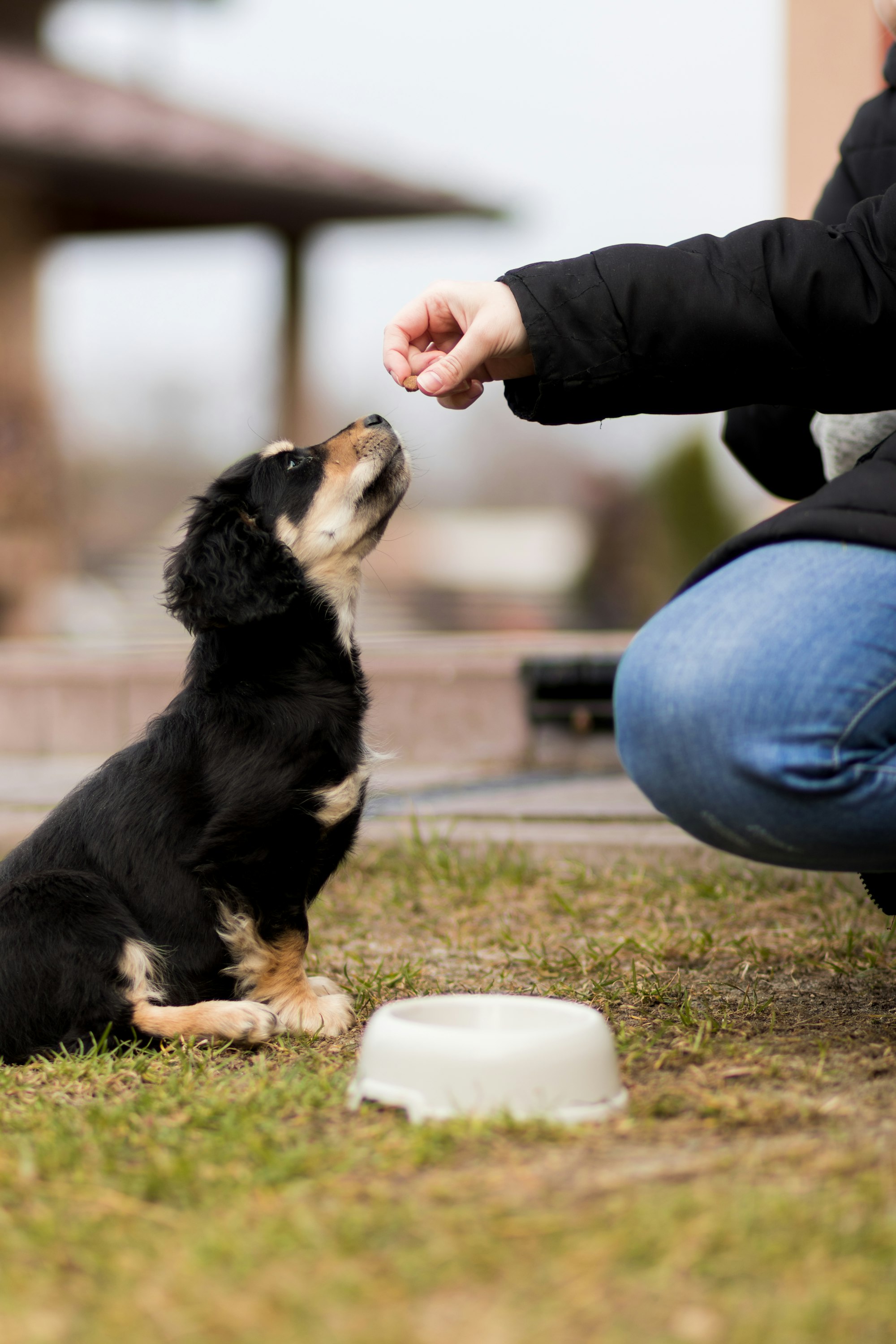The answer is a resounding yes. This humble grain, often found at the heart of human meals, plays a significant role in canine cuisine.
Let's begin with a relatable example. Imagine coming home after a long day, you decide to prepare a quick, simple meal for your dog. Scanning your pantry, your eyes land on a bag of rice. You've heard that rice can be good for dogs, but you're unsure. What if it's not suitable for your canine companion?
The Role of Rice in Canine Cuisine
You're not alone in your uncertainty. The debate about whether dogs should eat rice is as old as the tradition of domesticating dogs itself.
Rice is a staple in many commercially available dog foods. Its inclusion is primarily due to its high carbohydrate content, which provides dogs with a quick and easy energy source. It also works as a filler that can make your pet feel full, which is especially beneficial for those dogs who tend to overeat.
White Rice or Brown Rice: Which is Healthier?
This question is similar to the debate in human nutrition circles. Brown rice retains more natural nutrients because it's less processed. It has more fiber and is rich in essential vitamins and minerals.
On the other hand, white rice is more easily digestible, making it a perfect choice for dogs with sensitive stomachs or digestive issues. It is also beneficial in calming upset stomachs and can contribute to solid stools.
Let's take the case of Bella, a seven-year-old Beagle who loves to eat but unfortunately has a sensitive digestive system. Her human, Lisa, always ensures Bella's diet includes white rice because it's easy on her stomach and helps keep her digestive system in balance.
Are There Risks Involved?
Just as with any other food, moderation is key. While rice is generally safe for dogs, excessive consumption can lead to unnecessary weight gain due to its high carbohydrate content. It is crucial to ensure that rice does not replace essential proteins and fats in your dog's diet, which are vital for their overall health and development.
Consider the story of Max, a large German Shepherd with an insatiable appetite. His human, John, once replaced most of Max's protein intake with rice to satiate his hunger. Over time, this led to weight gain and other health issues. After a vet's visit, John learned the importance of a balanced diet for Max, ensuring that rice was part of the meal, not the entire meal.
The Role of Supplements in a Dog's Diet
While we're discussing canine nutrition, it's important to mention supplements like dog probiotics. Probiotics can be beneficial in maintaining your dog's gut health, especially if they are consuming rice regularly.
But what about other supplements? Melatonin for dogs can also play a crucial role, particularly for dogs that have trouble sleeping or suffer from anxiety.
And let's not forget about pill pockets for dogs, a nifty invention that allows dog owners to hide medicine inside a treat, so your dog takes their medication without any fuss.
These supplements, along with a balanced diet, can ensure your dog's optimal health.
Observing Your Dog for Health Issues
While rice can be a healthy addition to a dog's diet, it's important to keep an eye on your pet for any adverse reactions. Keep an eye out for signs of discomfort like flea bites on dogs, which can cause significant discomfort and potentially indicate a more severe problem.
Also, pay attention to your dog's dew claws. While these "extra" toes don't have much to do with nutrition, their health can be a good indicator of overall well-being.
Embracing New Advances in Canine Health
As dog owners, we always want to provide the best care possible for our furry friends. That's why many are turning to advancements like dog stem cell therapy, a cutting-edge treatment for a variety of canine ailments.
Dog stem cell therapy, along with proper nutrition, can contribute to your dog's overall health and longevity.

Delving Deeper: Rice and Canine Digestion
One of the key reasons why rice is a common ingredient in dog food is due to its contribution to healthy digestion. Dogs have different digestive systems than humans, and some foods that are perfectly fine for us can cause problems for our canine companions. Rice, however, is generally well-tolerated by dogs and can actually soothe digestive upset.
For instance, if your dog has been ill or is recovering from surgery, rice can be a gentle way to reintroduce food. Its blandness is unlikely to upset their stomach, and the carbohydrates can help replenish lost energy.
Consider Zoe, a young Border Collie who recently had surgery. During her recovery, Zoe's appetite was poor, and she was hesitant to eat her regular food. Her owners started mixing a little cooked rice into her meals, and Zoe's appetite began to return gradually. Not only did the rice provide additional energy, but it also helped ease her back into her regular feeding routine without upsetting her stomach.
Importance of Balance in Canine Diet
It's important to note that while rice can be beneficial, it shouldn't make up the bulk of a dog's diet. Dogs are omnivores, meaning they need a balanced diet of proteins, vegetables, and grains.
Have you ever wondered why dogs sometimes eat grass? This unusual behavior can be an instinctual way to add more fiber and other nutrients to their diet. Similarly, adding rice to your dog's diet can contribute to this balance of nutrients, providing valuable energy and aiding in digestion.
Take the case of Rufus, a Labrador Retriever known for his energetic and playful disposition. His owners ensure he gets a well-balanced diet of protein, vegetables, and grains, including rice. With this balance, Rufus maintains his high energy levels and overall good health.
Variety and Moderation in Canine Cuisine
Just like us, dogs enjoy a bit of variety in their food. Regularly including rice in your dog's diet can add a new texture and flavor that your dog might enjoy. Plus, it's a great way to use up any leftover rice from your meals!
However, be cautious about how much and how often you're feeding your dog rice. Too much of a good thing can quickly turn into a problem. Overfeeding can lead to weight gain and other health problems.
In the world of canine cuisine, rice can be a beneficial addition to your dog's diet. It's versatile, easily digestible, and most dogs find it tasty. As with any part of your dog's diet, the key is balance and moderation. Ensure your dog gets plenty of protein and vegetables, and use rice as a supplemental energy source. And of course, always keep an eye out for any changes in your dog's behavior or health, and consult with your vet if you have any concerns. With these considerations in mind, you can help keep your dog healthy and happy for years to come.
An Essential Tool for Dog Health: Fi Dog Collars
When it comes to maintaining your dog's health, diet isn't the only factor. Regular exercise is equally important for your canine companion. Just as rice can contribute to your dog's well-being, so can proper tracking of their physical activity. This is where tools like Fi dog collars come into play.
The Fi dog collar is more than just a collar. It's a cutting-edge piece of technology designed to help dog owners monitor their pet's physical activity and location. Let's relate this back to our rice discussion and consider the importance of balance in a dog's diet. A dog who consumes rice regularly but doesn't exercise enough might gain unwanted weight.
Let's revisit the case of Lucy, the French Bulldog who loved her rice meals. After noticing her weight gain, Lucy's owners not only adjusted her portions but also invested in a Fi dog collar. This way, they could keep track of Lucy's daily physical activity and ensure she was getting enough exercise to balance out her diet.
Using Technology for a Balanced Lifestyle
Consider Max, the German Shepherd we mentioned earlier. Max's owner, John, uses the Fi collar to ensure Max gets enough exercise to match his diet. The collar's activity tracker allows John to monitor Max's physical activity levels and compare them to other dogs of the same breed. This feature helped John to create a balanced lifestyle for Max, combining a diet that includes rice with the right amount of exercise.
This all-in-one smart collar can not only contribute to maintaining an optimal weight but can also provide peace of mind for dog owners. With its GPS tracking feature, you'll always know where your furry friend is. This is particularly useful for energetic breeds that need more exercise and may tend to wander off or escape.

Conclusion:
In conclusion, rice can indeed be a beneficial part of canine cuisine. Both brown and white rice have their place in a dog's diet, contributing to good digestion and providing essential energy. However, it's crucial to maintain a balanced diet that also includes protein, vegetables, and beneficial supplements like dog probiotics.
Regular monitoring for any health issues and keeping up with advancements in canine health care can ensure your furry friend stays in top shape. Tools like the Fi dog collar can further contribute to your pet's well-being by monitoring their physical activity levels. With the right balance in diet and exercise, your dog can enjoy a happy and healthy life.
Frequently Asked Question (FAQs)
- Is rice good for dogs' health?
Yes, rice can be a beneficial part of a dog's diet. It provides carbohydrates for energy and can aid in digestion. However, it should be part of a balanced diet that also includes proteins and vegetables. - Can I feed my dog rice every day?
While rice is generally safe for dogs, it's best served in moderation. Overconsumption can lead to weight gain and other health issues. Ensure it does not replace essential proteins and fats in your dog's diet. - What kind of rice is best for dogs?
Both white and brown rice have benefits for dogs. Brown rice is less processed and contains more nutrients, but white rice is more easily digestible and can be better for dogs with sensitive stomachs. - How can I balance my dog's diet with rice?
To balance your dog's diet with rice, ensure that it doesn't make up the majority of their meal. Pair rice with a good source of protein and vegetables to provide a well-rounded meal. - How can Fi dog collars help in maintaining my dog's health?
Fi dog collars are a useful tool for tracking your dog's physical activity, which is an important part of their overall health. This can be particularly beneficial if your dog's diet includes carbohydrate-rich foods like rice. - How do dog probiotics and melatonin for dogs fit into my pet's diet?
Dog probiotics can help maintain your pet's gut health, especially important if they regularly consume rice. Melatonin for dogs can be useful for pets suffering from sleep issues or anxiety. - What is the significance of dog stem cell therapy in my pet's health?
Dog stem cell therapy is an innovative treatment that can potentially help with various canine health issues. It's one of the many ways owners can proactively care for their pet's health, alongside a balanced diet and regular exercise.